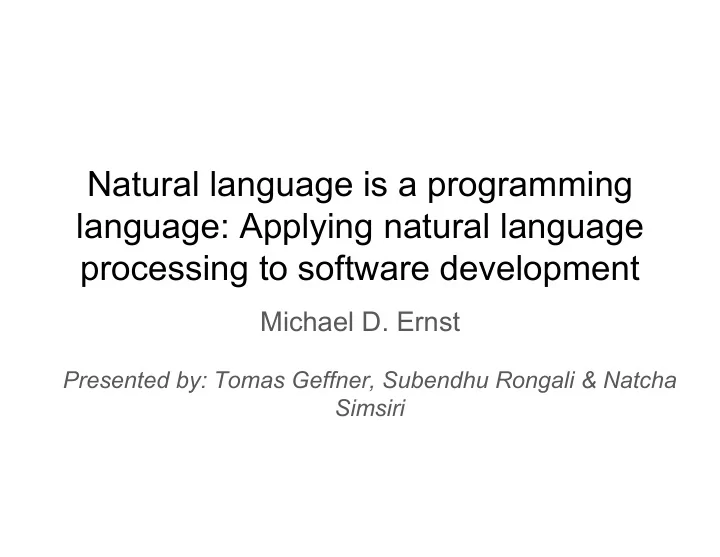

Natural language is a programming language: Applying natural language processing to software development Michael D. Ernst Presented by: Tomas Geffner, Subendhu Rongali & Natcha Simsiri
Before we start, what is software? Not just code/AST It is also: ● test cases ● documentation ● variable names ● program structure ● the version control repo ● the issue tracker ● conversations ● user studies ● program executions ..and much more
Issue How do we create better software tools? Previous tools mostly depend on the ASTs of code. But software isn’t just ASTs of the code! Why not look at software more comprehensively?
Research Problem Can we create better software development tools using additional artifacts developers create (e.g documentation, bug report, etc)? Some common problems - inadequate error messages, incomplete test suite etc.
Key Idea & Contributions Use NLP techniques to analyse the natural language embedded in the software and solve some problems. NLP based solutions for four common software problems. ● Detection of inadequate diagnostic messages ● Identifying undesired variable interactions ● Generation of test oracles ● Generating code from natural language specifications
Detection of inadequate diagnostic messages $ python route.py -port_num=100 unexpected system failure your port number sux lol your port number is already in use Inadequate diagnostic messages waste 25% of a software maintainer’s time!
What can we do? ConfDiagDetector: Tells you if your error messages are adequate. Configuration mutation + NLP Mutate a configuration option to get an error Doc similarity between configuration option description and the error message
Evaluation - does it work? ConfDiagDetector reported 25 missing and 18 inadequate messages in four open-source projects: Weka, JMeter, Jetty, and Derby. Validation by three programmers indicated a 0% false negative rate and a 2% false positive rate (previous best tool has 16% false positive). Previous methods all troubleshoot an exhibited error or require lots of help like source code, usage history and OS-level support.
Identifying Undesired Variable Interactions Incompatible variable interactions are a common mistake. ex: totalPrice = itemPrice + shippingDistance You can tell it’s wrong looking at the variable names.
What can we do? Ayudante: Clusters the variables in two ways. 1) NLP based - Tokenize words, compute similarity using WordNet or edit distance 2) Abstract Type Inference - Variables that interact with each other in code (ex. x < y) Identify discrepancies between clusters
Evaluation - does it work? Ayudante’s top-ranked report about the grep program indicated an interaction in grep that was likely undesired, because it discards information. There are variable naming conventions. Some languages allow storing units. No exact previous work. Components like tokenization outperform prior methods.
Generation of test oracles Programmers don’t like writing not-code. Manual test suites neglect important behavior. Automatic ones lack gold standard.
What can we do? Let’s use code comments - Javadoc comments, templates ToraDocu: Convert sentences into assertions - English to code using parse trees!
Evaluation - does it work? 941 programmer-written Javadoc specifications - 88% precision and 59% recall in translating them to executable assertions Improved the fault-finding effectiveness of EvoSuite and Randoop test suites by 8% and 16% Sophisticated NLP - better than simple pattern matching techniques.
Generating code from natural language specifications
What can we do? Tellina: Neural machine translation from english to code using RNNs.
Evaluation - does it work? Convert english specifications of file systems operations to bash. Trained on 5000 <text, bash> pairs from StackOverflow and bash tutorials. Top-1 and top-3 accuracy for the structure of the command - 69% and 80% Some errors - but still useful to programmers! Previous works were on simple languages, regexes etc.
Summary Catchy names for tools
Discussion questions 1. Can we do direct translation for code that’s more than a single line?
Discussion questions 2. Do we really create test oracles if we only have 88% precision?
Discussion questions 3. Can we trust programmers to use good variable names? Can we improve their method?
Discussion questions 4. Can we use translation instead of parse trees for problem 3?
Discussion questions 5. We only analyze diagnostic messages for configuration option erros. Can we do this for any error in general?
Recommend
More recommend